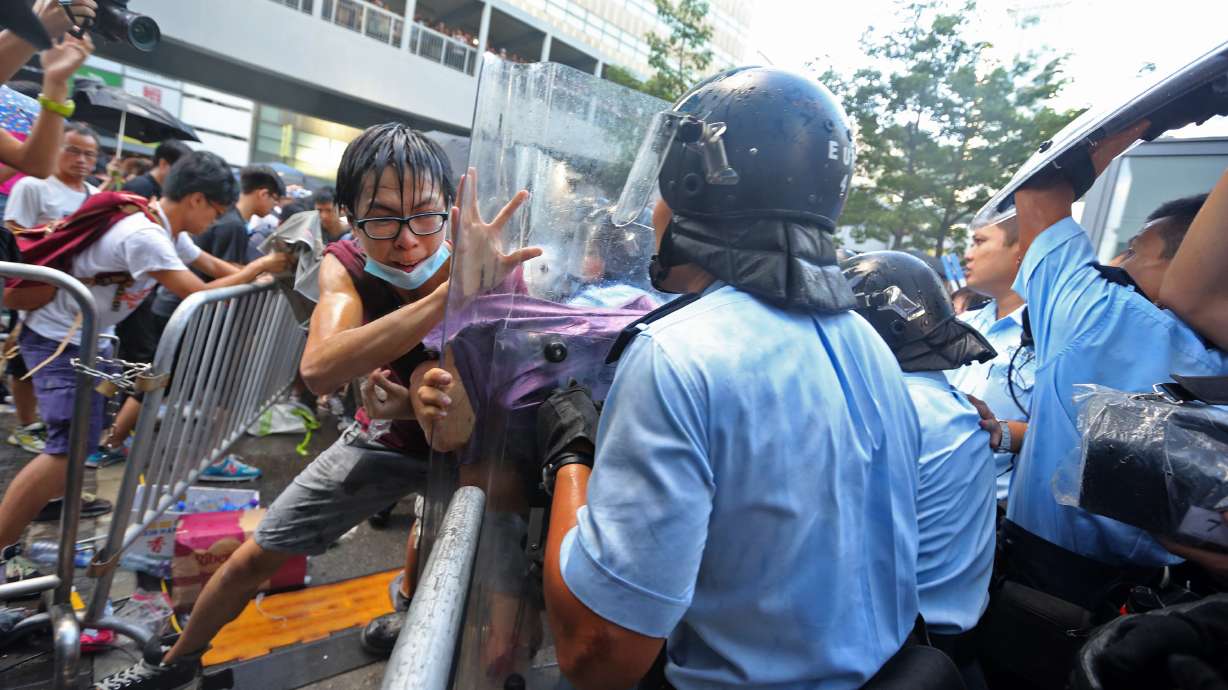Estimated read time: 4-5 minutes
This archived news story is available only for your personal, non-commercial use. Information in the story may be outdated or superseded by additional information. Reading or replaying the story in its archived form does not constitute a republication of the story.
HONG KONG (AP) — Hong Kong activists kicked off a long-threatened mass civil disobedience protest Sunday to challenge Beijing over restrictions on voting reforms, escalating the battle for democracy in the former British colony after police arrested dozens of student demonstrators.
The announcement by civil leaders came after a big crowd of tens of thousands turned out around midnight Saturday to support the student protesters who stormed into a courtyard of the government complex and scuffled with police wielding pepper spray. Police arrested at least 74 people, including some in their teens.
The night passed peacefully as more than 1,000 exhausted and weary protesters — most of them students — remained on the streets outside government headquarters and erected makeshift barricades with open umbrellas to slow any advance by police. They slept wearing face masks and protective gear of Saran-wrapped arms, cheap plastic raincoats and goggles, as tired-looking riot police looked on. Some students hurried to join them Sunday morning, saying they didn't want to leave their friends in case of a police crackdown, but the crowd later dwindled to a few hundred.
Many students were not happy that their protest was taken over by Occupy Central with Love and Peace, a broader movement fighting for democratic reform.
The Occupy Central movement had originally planned to paralyze the Asian financial hub's central business district on Wednesday, but organizers moved up the start of their protest and changed the location in an apparent bid to harness momentum from the student rally outside the government complex in the southern Chinese city.
"I think it's quite ridiculous for them to do such a thing ... but I decided to stay because they have the same aim for democracy," said university student Li Xi-lang Harold, 19.
Democracy supporters are demanding that China's Communist leaders allow fully democratic elections in 2017.
China, which took control of the former British colony in 1997, has promised that Hong Kong's top leader can be chosen through universal suffrage. But tensions over Hong Kong's political future boiled over after China's legislature last month ruled out letting the public nominate candidates, instead insisting they be screened by a committee of Beijing loyalists similar to the one that currently picks the city's leader.
Hong Kong's young people have been among the most vocal supporters of full democracy in recent years, fueled by anger over widening inequality. They also fear that Beijing's tightening grip is eroding the city's rule of law and guaranteed civil liberties unseen on the mainland such as freedom of speech.
Organizers of Occupy Central said they want Beijing to abandon its decision and the Hong Kong government to resume political reform consultations
"The courage of the students and members of the public in their spontaneous decision to stay has touched many Hong Kong people," the group said in a statement. "Yet, the government has remained unmoved. As the wheel of time has reached this point, we have decided to arise and act."
The protest at the government headquarters followed a weeklong strike by thousands of students demanding China's Communist leaders allow Hong Kong fully democratic elections in 2017. University and college students who had spent the week boycotting classes were joined Friday by a smaller group of high school students.
Organizers estimated that 50,000 people had flooded the streets around the government complex at the peak of the protest. Police did not give an estimate.
At least 34 people have been injured since the protest began, including four police officers and 11 government staff and guards, authorities said. One of the officers suffered a gash after being poked by one of the umbrellas the protesters have been using to deflect pepper spray.
Police issued a news release urging the protesters to leave peacefully and avoid obstructing officers, saying that otherwise they would "soon take actions to restore public order."
Many young protesters appeared conflicted that their protest was morphing into Occupy Central.
"A lot of students left as soon as Occupy made the announcement they were starting their occupation," said Vito Leung, 24, a recent university graduate.
"I think they were really forcing it. This was always a separate student movement with similar goals but different directions. I don't think it should be brought together like this," said Leung, who was vowing to stay until police released Joshua Wong, the 17-year-old leader of the activist group Scholarism.
Wong was among the first of the protesters to be arrested after storming the government complex, and was carried away by four officers. A recent high school graduate, he gained prominence two years ago after he organized protests that forced Hong Kong's government to back off plans to introduce a Chinese national education curriculum that some feared was a form of brainwashing.
Copyright © The Associated Press. All rights reserved. This material may not be published, broadcast, rewritten or redistributed.









